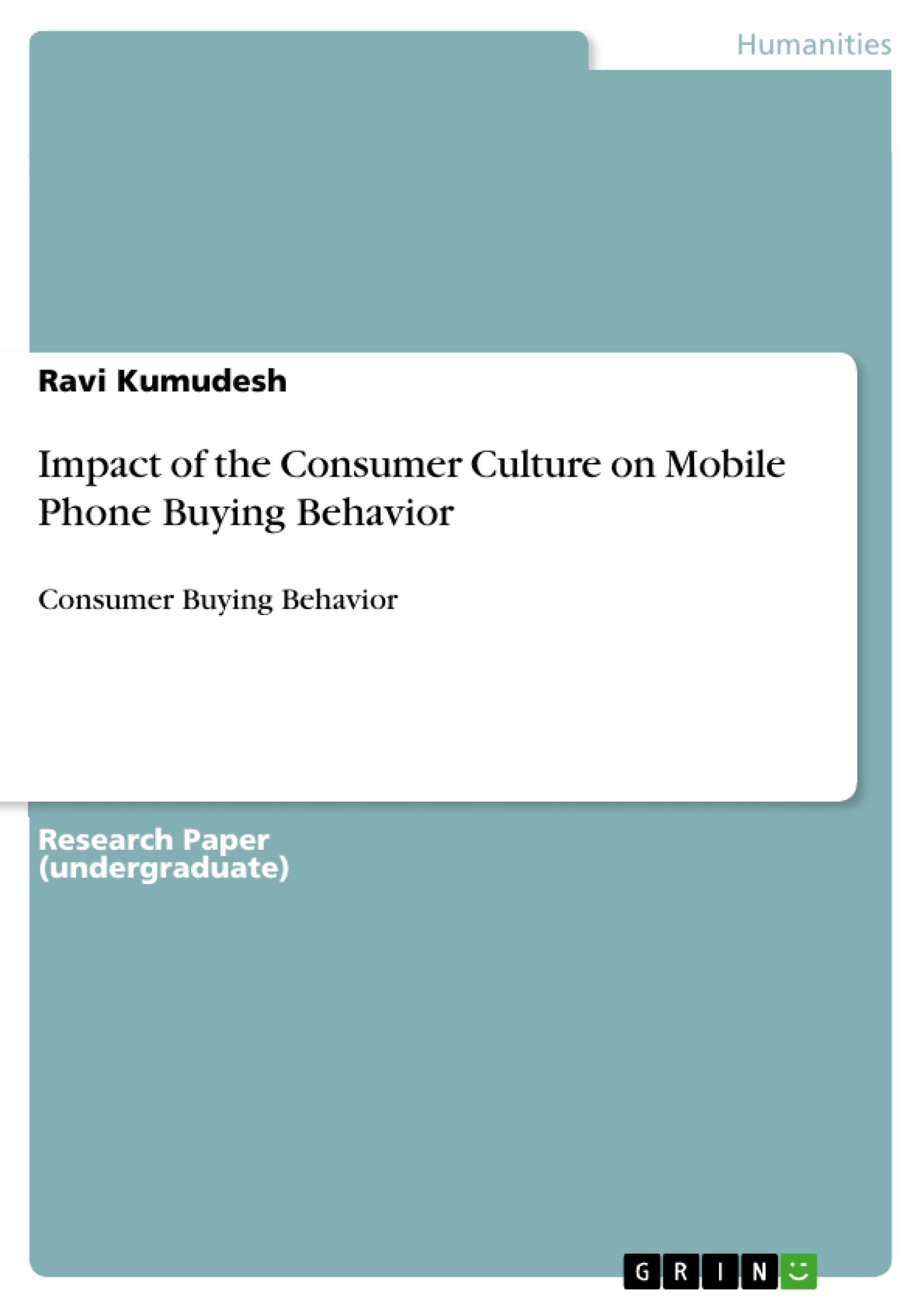The aim of this research is identify the consumer culture of Sri Lanka related to the mobile phone buying behavior. Data was collected from 20 questionnairs. The findings indicate the mobile phone buying behavior is based on aptitude of technology and utility, income level, age, gender, and life style of the consumer.
Consumers in low income category have given an ornamental value to the phone apart from utility value. Urban consumers have developed a favorable consumer culture in purchasing mobile phone. But sub urban and rural consumers have shown a fear on mobile phone usage. Mobile phone consumers in young age use expensive mobile phones with ornamental value. Gender variation dependent aptitude could be observed regarding the value of enhancing family relationship. It reflects the Sri Lankan culture on female.
Overall the consumer culture of Sri Lanka still depends on the personal usage, traditions and ornamental values of the phone with regards to the mobile phone buying behavior.
Inhaltsverzeichnis (Table of Contents)
- Introduction
- Mobile phones
- Literature Review
- The concept of culture
- Power Distance
- Individualism / Collectivism
- Cultural Values
- Buying Behavior Factors
- Objectives
- Methodology
- Data collection
- Sample size
- Analysis
- Analysis
- Sample profile
- Gender distribution
- Age distribution of the sample
- Occupational Status of the Sample
- Social Status of the Sample
- Income Levels of the Sample
- Data Analysis
- Sample profile
- Conclusion
Zielsetzung und Themenschwerpunkte (Objectives and Key Themes)
This work aims to investigate the influence of cultural dimensions on mobile phone purchasing behavior. It explores how cultural values shape consumer preferences and motivations in the context of mobile phone acquisition.
- The impact of cultural dimensions on consumer behavior
- The role of cultural values in mobile phone purchasing decisions
- The relationship between cultural dimensions and buying behavior factors
- The influence of power distance and individualism/collectivism on consumer culture
- The significance of cultural considerations for marketing strategies and product design
Zusammenfassung der Kapitel (Chapter Summaries)
- Introduction: This chapter introduces the topic of mobile phones and their increasing prevalence globally. It highlights the importance of cultural dimensions in understanding consumer preferences and mobile phone purchasing behavior.
- Literature Review: This chapter provides an overview of relevant literature on the concept of culture, including definitions, dimensions, and their influence on individual behavior. It explores the impact of power distance, individualism/collectivism, and cultural values on consumer culture.
- Methodology: This chapter outlines the methodology employed in the study, including data collection methods, sample size, and analysis techniques.
- Analysis: This chapter presents the results of the data analysis, including a profile of the sample and an examination of the relationship between cultural dimensions and mobile phone purchasing behavior.
Schlüsselwörter (Keywords)
This study focuses on key terms and concepts including cultural dimensions, consumer behavior, mobile phone purchasing, power distance, individualism/collectivism, cultural values, buying behavior factors, and marketing strategies.
Frequently Asked Questions
How does consumer culture in Sri Lanka affect mobile phone purchases?
Buying behavior is heavily influenced by income level, age, gender, and traditions, often giving phones an ornamental value beyond their utility.
What is the difference between urban and rural consumers in Sri Lanka?
Urban consumers are more comfortable with mobile technology, while sub-urban and rural consumers often show a certain fear or hesitation regarding mobile usage.
Why do low-income consumers buy expensive mobile phones?
The research finds that low-income categories often value the phone as an "ornamental" item or status symbol, prioritizing its look and social value.
How does gender influence mobile phone usage in Sri Lanka?
There is a gender variation where females particularly value mobile phones for enhancing and maintaining family relationships, reflecting local cultural values.
What role do cultural dimensions like Power Distance play?
Cultural dimensions like Power Distance and Individualism/Collectivism shape the motivations behind purchasing decisions and brand preferences in the Sri Lankan market.
- Arbeit zitieren
- Ravi Kumudesh (Autor:in), 2012, Impact of the Consumer Culture on Mobile Phone Buying Behavior, München, GRIN Verlag, https://www.grin.com/document/204021



